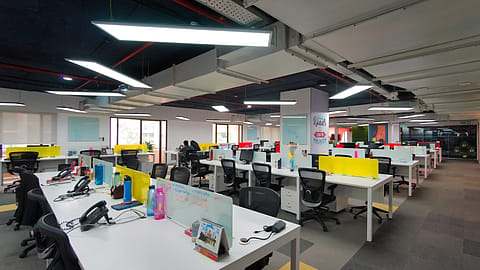Private sector activity at 9-month low in September
Both manufacturing and service sectors exhibited similar trends in Sept, but the pace of growth well above long-term average, HSBC Flash India PMI Output Index shows

The flash composite PMI, which gauges private sector activity in India, rose at a slightly slower pace at 59.3, a nine-month low, in September compared to 60.7 in August, thus marking the slowest growth observed in 2024.
Both the manufacturing and service sectors exhibited similar trends during the month, but the pace of growth remained well above the long-term average, according to the latest HSBC Flash India Composite PMI Output Index, compiled by S&P Global.
The month was better in terms of hiring and business confidence. "Growth in new orders moderated by touch in September, but hiring levels rose at a faster pace, supported by improving business confidence. In fact, the rise in employment in the service sector was the steepest since August 2022, as companies responded to robust growth in new orders," says Pranjul Bhandari, Chief India Economist at HSBC.
On the price front, input cost inflation rose at a slightly quicker pace in September. "Rates of increase in output charges slowed in both sectors, with manufacturers experiencing a larger slowdown, implying a bigger reduction in their margins,” Bhandari says.
Softer expansions were seen across both the "manufacturing and services sectors". The HSBC Flash India Manufacturing PMI -- a single-figure snapshot of factory business conditions calculated from measures of new orders, output, employment, supplier delivery times and stocks of purchases -- posted 56.7 in September, down from 57.5 in August. It signalled a strengthening in business conditions for goods producers, but the rate of improvement was the softest since January. The expansion in total business activity reflected "increasing new orders", which also saw the pace of growth easing and was the softest in the year-to-date.
Backlogs of work rose only fractionally in September. The report says companies were able to keep on top of workloads in September, as the backlogs of work rose at the slowest pace in just over two-and-a-half years.
Manufacturers also expanded their purchasing activity during September, which supported an increase in the stocks of inputs as suppliers continued to deliver goods promptly. But the stocks of finished goods decreased to the "largest extent" in four months, in part due to a slowdown in the growth of production.
(INR CR)
The pace of 'input cost inflation' in the private sector remained relatively "muted" in September, despite rising slightly from that seen in August. "Marginally faster increases were seen across both the manufacturing and services sectors. Where costs rose, firms generally linked this to higher prices for raw materials and electricity."
The rate of output price inflation remained similarly muted in the latest survey period, coming in just below the series average. "In fact, the latest rise in charges was only modest and the least marked since February. The pace of inflation in the manufacturing sector remained solid, despite easing further from July's recent peak." Meanwhile, service providers increased their charges at the slowest pace since February 2022, the HSBC data shows.
Despite the softer expansions in both output and new orders in September, companies in India remained strongly optimistic that business activity will increase over the coming year.